Harry Potter 20th anniversary: The UK film locations
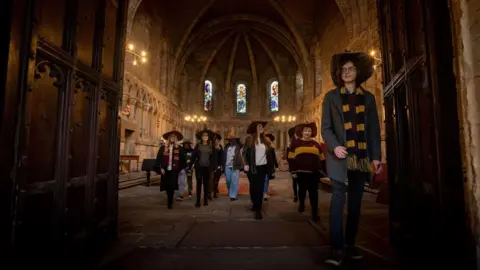 Durham Cathedral
Durham CathedralIt's 20 years since the boy wizard Harry Potter hit the big screen.
In November 2001, Harry Potter and the Philosopher's Stone was released in cinemas and it was cool for adults to be seen on beaches, buses or trains with their heads in one of the phenomenally-popular children's books.
However, no one location would do to bring the wizarding magic to life when the novels were made into films.
A number of locations including cathedrals, a castle and places of historic interest across England soon had new claims to fame.
Durham Cathedral, Durham City
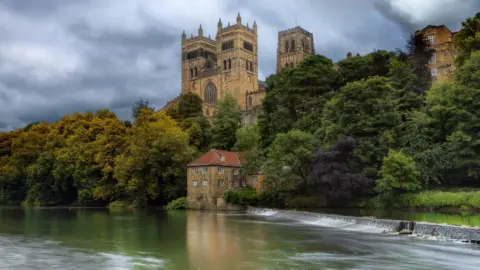 Getty Images
Getty ImagesHogwarts School of Witchcraft and Wizardry came to life in various locations, including Durham Cathedral's ancient cloisters in the franchise's first big screen outing.
Also the cathedral's Chapter House was the location of Professor McGonagall's transfiguration classroom scenes.
To celebrate the anniversary, fans are being urged to visit on Saturday from 10:00 to 14:00 GMT and don their wizarding house colours and robes and see if they can spot which places in the cathedral made it to the big screen.
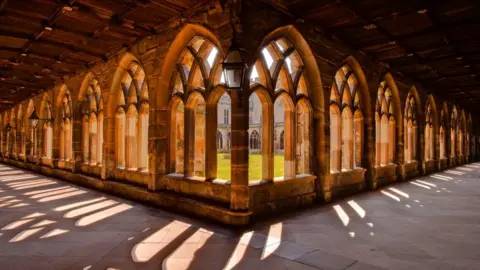 Getty Images
Getty ImagesMersey Tunnels, Liverpool
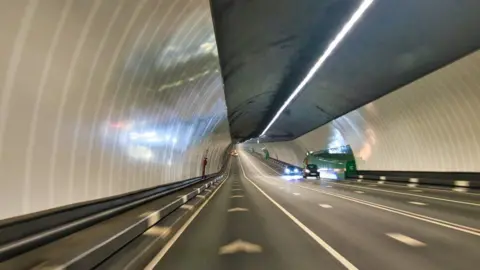 Getty Images
Getty ImagesUp to 90,000 vehicles pass through Liverpool's Mersey Tunnels every day, but only one giant on a flying motorbike - with the world's most famous wizard in his side car - has travelled through them.
In 2010, Harry Potter - Daniel Radcliffe - and Hagrid - Robbie Coltrane - turned up in the city to film the dramatic chase scene in The Deathly Hallows Part One.
Fleeing Voldemort and his Death Eaters, in the film they are seen taking a detour through the Queensway Tunnel, narrowly missing the oncoming traffic.
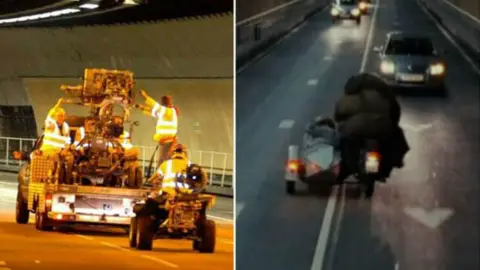 Visit Liverpool
Visit LiverpoolMerseytravel, which owns and operates the tunnels, was paid £20,000 by Warner Brothers for the use of the Queensway Tunnel.
It donated the money to a children's hospice.
De Vere House, Lavenham, Suffolk
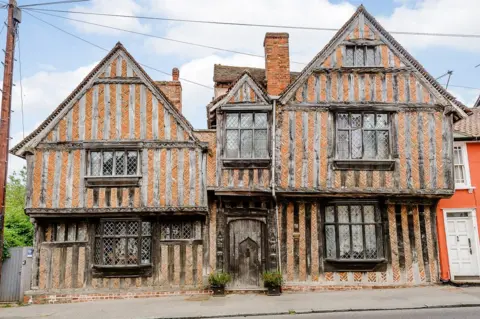 FTP Edelman
FTP EdelmanThe 14th Century De Vere House in Lavenham, Suffolk, was used as the birthplace of Harry in the Deathly Hallows Part One.
But it was also the site of something darker - it was also where the young wizard's parents were killed by Lord Voldemort.
It was put up for sale for almost £1m in 2017, but conjuring up a buyer was a struggle and it is currently an attraction on Airbnb.
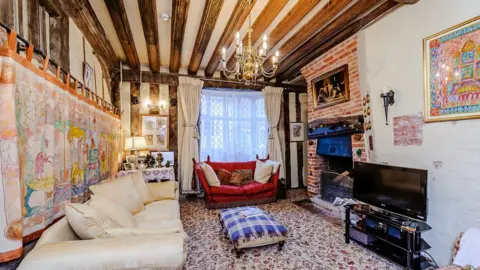 FTP Edelman
FTP EdelmanIt formed part of Godric's Hollow in the film and was seen with a Christmas tree in the window, opposite a fictional graveyard.
The house is among about 340 listed buildings in Lavenham, considered to be the best-preserved medieval village in England.
Gloucester Cathedral, Gloucestershire
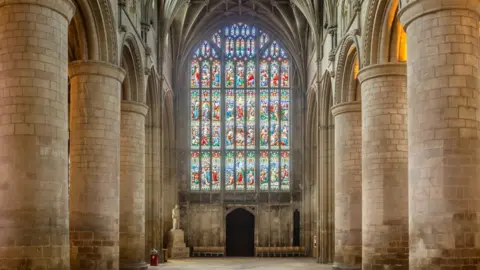 Getty Images
Getty ImagesGloucester's historic cathedral cloisters were transformed into the corridors of Hogwarts for the first two films and the Gothic building's lavatorium - a washing place - also features several times.
In the first of the film series, the troll who smashed up the girls' toilets, trapping Hermione, is seen walking along the cloisters, while Harry and Ron hid in the Lavatorium.
The cathedral makes a reappearance in the second film when its North Walk features the words written in blood which announce the Chamber of Secrets has been opened.
A few steps away is where Moaning Myrtle flooding the toilets.
The Lavatorium also provided a hiding place for the boy wizard in Harry Potter and the Half-Blood Prince - the sixth in the franchise - as he overhears Professor Snape saying how he had already taken the unbreakable vow.
More than 170 pupils aged 11 to 18 from the nearby King's School were given a first leg up on the acting ladder and starred as extras in the multimillion-pound production.
The Zoological Society of London (ZSL) Zoo, Regent's Park
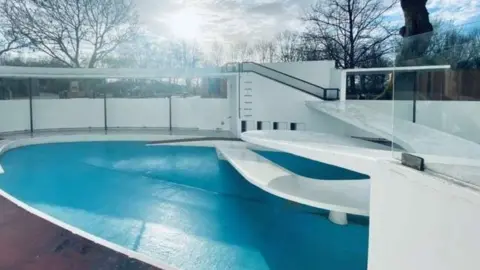 ZSL London Zoo
ZSL London ZooThe Reptile House at ZSL London Zoo is home to an amazing collection of reptiles and amphibians, including snakes, lizards, frogs and crocodiles.
It was thought to be the perfect setting - with its dim lighting - to film Harry's creepy encounter with a talking Burmese python which he frees in the Philosopher's Stone.
In real life, the enclosure filmed is home to a black mamba snake.
Lacock, Wiltshire
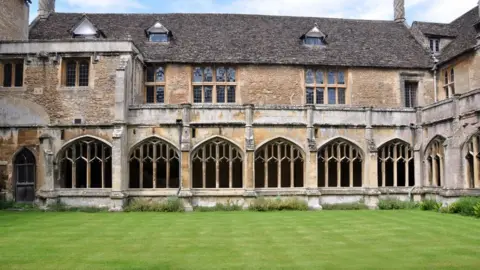 Getty Images
Getty ImagesThe village of Lacock in Wiltshire has become know as "Harry Potter village" over the years because it was used so many times as a location for the films.
Scenes from the Philosopher's Stone, the Chamber of Secrets, the Half-Blood Prince, and most recently Fantastic Beasts: The Crimes of Grindelwald were all filmed there, probably because of its varied architecture with some buildings dating back to the 14th Century.
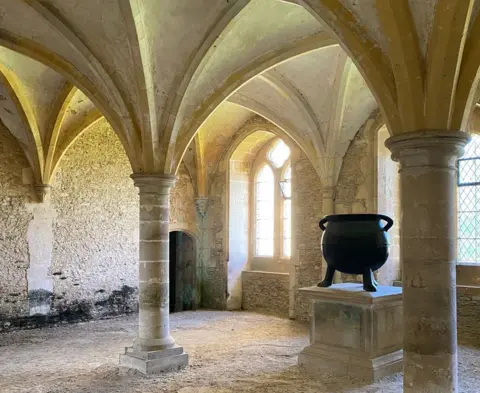
Lacock Abbey, one of many locations to become Hogwarts, is a country house with monastic roots and was once the home of William Henry Fox Talbot, inventor of the photographic negative.
Among other filming locations, the abbey's Warming Room was turned into the classroom where Professor Snape's potions lessons were taught.
Scenes from BBC period dramas such as Wolf Hall and Pride and Prejudice were also filmed here, according to the National Trust which owns most of the village.
Glenfinnan Viaduct, Scottish Highlands
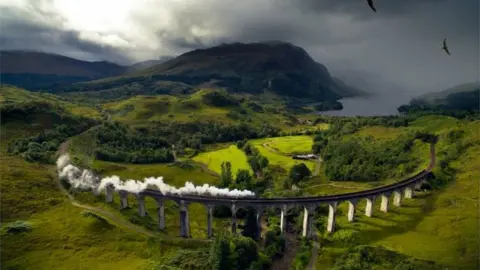 Getty Images
Getty ImagesThe Glenfinnan Viaduct in the Lochaber area of the Highlands of Scotland saw the Hogwarts Express travel over it for the filming of the second and third Harry Potter books.
The 19th Century viaduct has been used as a location in several films and television series, including Ring of Bright Water, Charlotte Gray, Monarch of the Glen, Stone of Destiny and The Crown.
After its appearance in the Harry Potter films, British Transport Police warned fans not to walk on the viaduct after several near-misses with trains.
Alnwick Castle, Northumberland
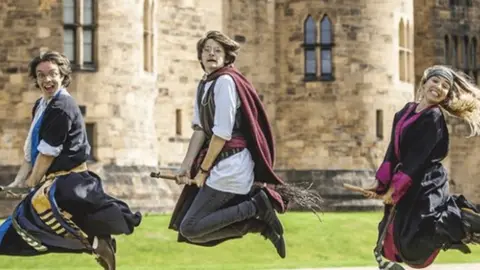 Alnwick Castle
Alnwick CastleAlnwick Castle in Northumberland also starred as Hogwarts School during the Philosopher's Stone and the Chamber of Secrets in 2002.
The Outer Bailey was used as the area where Harry and his fellow students learnt the rules of wizarding sport Quidditch while the Inner Bailey was where Harry and Ron crash-landed the Weasley family's flying car.
Owned by the Duke and Duchess of Northumberland, the castle now offers "broomstick training" to its younger visitors.
